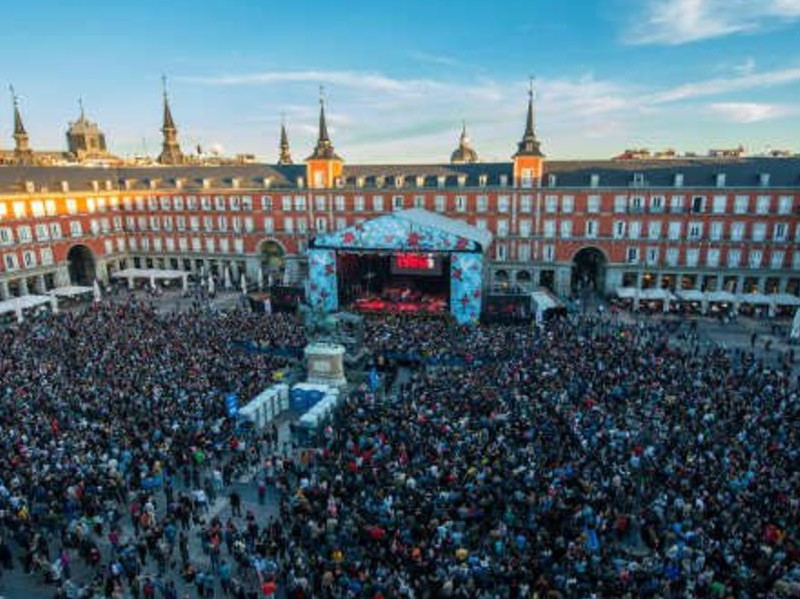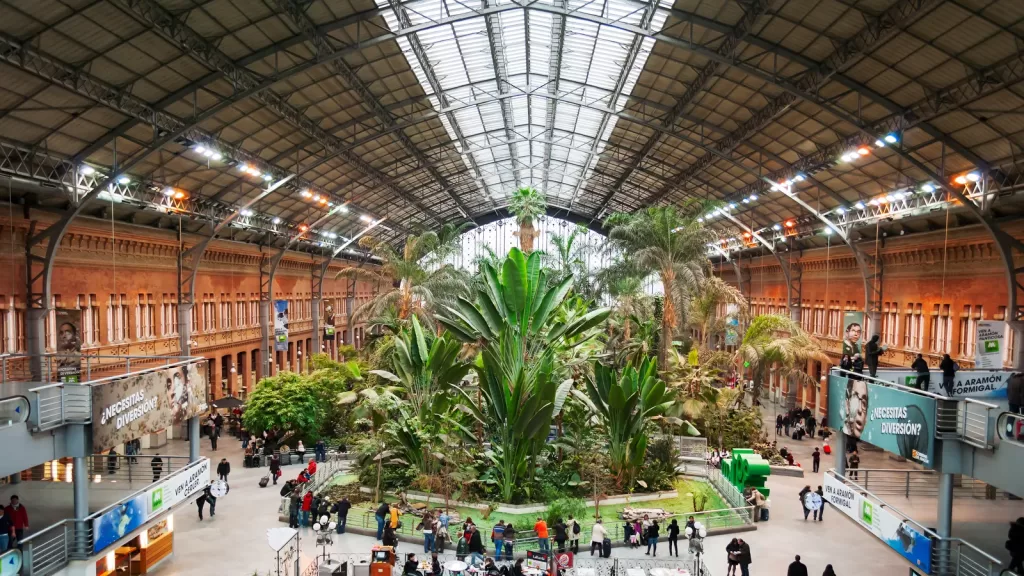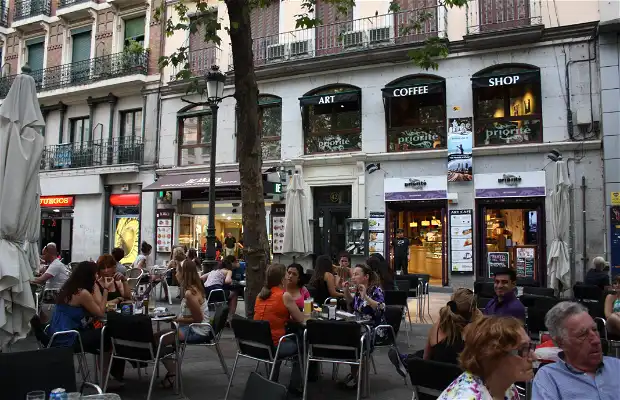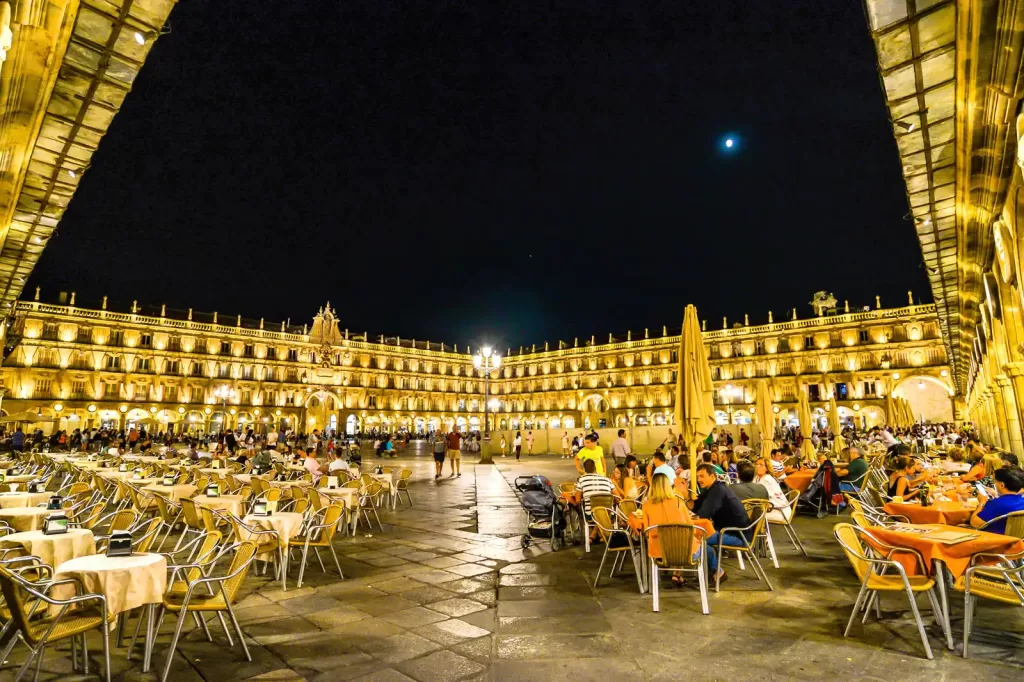Living in Madrid can be a wonderful experience
The city is known for its vibrant culture, rich history, and lively atmosphere. Here are some key aspects of living in Madrid:
Weather
Madrid has a Mediterranean climate, with hot summers and mild winters. Summers can be scorching, with temperatures often exceeding 30 degrees Celsius (86 degrees Fahrenheit). Winters are generally mild, with temperatures rarely dropping below freezing.
Cost of living
Madrid is generally more affordable compared to other major European cities like London or Paris. However, the cost of living can still be high, especially in popular neighborhoods like Salamanca or Chamberí. Rent, groceries, and dining out are some of the main expenses to consider.
Transportation
Madrid has an extensive public transportation system, including buses, metro, and trains. The metro is particularly efficient and covers most areas of the city. Biking is also becoming increasingly popular, with many bike lanes and rental services available.
Cultural scene
Madrid is known for its vibrant cultural scene. The city is home to numerous museums, art galleries, theaters, and music venues. The Prado Museum, Reina Sofia Museum, and Thyssen-Bornemisza Museum are some of the most famous cultural attractions.
Nightlife
Madrid is famous for its nightlife, with a wide range of bars, clubs, and live music venues. The city comes alive at night, and it’s common for people to go out late and stay out until the early hours of the morning.
Food
Madrid is a food lover’s paradise. The city offers a diverse culinary scene, with traditional Spanish dishes like paella, tapas, and churros being popular. There are also many international restaurants and trendy food markets to explore.
Parks and green spaces
Madrid has several beautiful parks and green spaces where you can relax and enjoy nature. Retiro Park is the most famous, with its large lake, gardens, and iconic Crystal Palace. Casa de Campo and Madrid Río are also popular outdoor areas.
Festivals and events
Madrid hosts numerous festivals and events throughout the year. The San Isidro Festival in May, Pride Parade in July, and La Paloma Festival in August are some of the most important celebrations. There are also cultural events, concerts, and sports competitions happening regularly.
Overall, living in Madrid offers a unique blend of history, culture, and modernity. The city’s energy and vibrant lifestyle make it an exciting place to call home.

San Isidro Festival
Is moving to Madrid a good idea?
Moving to Madrid can be a good idea for many reasons. Here are some factors to consider:
Job opportunities
Madrid is the economic and financial hub of Spain, offering a wide range of job opportunities across various industries. The city is home to many multinational companies, startups, and business centers, making it a favorable destination for career growth.
Cultural immersion
Madrid is known for its rich cultural heritage and vibrant lifestyle. Moving to Madrid allows you to immerse yourself in Spanish culture, language, and traditions. You can explore historical sites, visit world-class museums, and experience the city’s lively festivals and events.
Education
Madrid is home to several prestigious universities and educational institutions. If you are looking to pursue higher education or enroll your children in quality schools, Madrid offers a wide range of options.
Travel opportunities
Madrid’s central location in Spain makes it an excellent base for exploring the rest of the country. You can easily travel to other cities like Barcelona, Seville, or Valencia, as well as visit nearby countries in Europe.
Quality of life
Madrid consistently ranks high in terms of quality of life. The city offers excellent healthcare facilities, a reliable public transportation system, and a high level of safety. The food scene, cultural activities, and recreational opportunities contribute to a fulfilling lifestyle.
However, it’s important to consider some potential challenges:
Language barrier
While many people in Madrid speak English, Spanish is the primary language. If you don’t speak Spanish, it may take some time to adjust and communicate effectively.
Cost of living
While Madrid is generally more affordable than other major European cities, the cost of living can still be high, especially in popular neighborhoods. Rent, utilities, and daily expenses should be factored into your budget.
Crowded city
Madrid is a bustling city with a large population. Traffic congestion and crowded public transportation can be common, especially during peak hours.
Ultimately, whether moving to Madrid is a good idea depends on your personal circumstances, goals, and preferences. It’s recommended to visit the city beforehand, do thorough research, and consider all aspects before making a decision.
Is Madrid a good place to live?
Yes, Madrid is generally considered a good place to live for many reasons. Here are some factors that contribute to its appeal:
Quality of life
Madrid consistently ranks high in terms of quality of life. The city offers a wide range of amenities, including excellent healthcare facilities, a reliable public transportation system, and a high level of safety. The city’s parks, cultural activities, and recreational opportunities contribute to a fulfilling lifestyle.
Vibrant culture
Madrid is known for its rich cultural heritage and lively atmosphere. The city is home to numerous museums, art galleries, theaters, and music venues. There are always events, festivals, and exhibitions happening, providing ample opportunities for cultural immersion and entertainment.
Job opportunities
Madrid is the economic and financial hub of Spain, offering a wide range of job opportunities across various industries. The city is home to many multinational companies, startups, and business centers, making it a favorable destination for career growth.
Education
Madrid is home to several prestigious universities and educational institutions. Whether you are looking to pursue higher education or enroll your children in quality schools, Madrid offers a wide range of options.
Food and nightlife
Madrid is a food lover’s paradise. The city offers a diverse culinary scene, with traditional Spanish dishes, international cuisine, and trendy food markets to explore. Madrid is also famous for its vibrant nightlife, with a wide range of bars, clubs, and live music venues.
Central location and travel opportunities
Madrid’s central location in Spain makes it an excellent base for exploring the rest of the country. You can easily travel to other cities like Barcelona, Seville, or Valencia, as well as visit nearby countries in Europe.
However, it’s important to consider individual preferences and circumstances when determining if Madrid is a good place to live. Factors such as personal interests, language proficiency, and cost of living should be taken into account. It’s recommended to visit the city, do thorough research, and consider your specific needs before making a decision.

Madrid Atocha Train Station
How much money do you need to live comfortably in Madrid?
The amount of money needed to live comfortably in Madrid can vary depending on individual circumstances and lifestyle choices. Here are some key expenses to consider:
Housing
Rent prices in Madrid can vary significantly depending on the neighborhood and the size of the apartment. In popular areas, such as Salamanca or Chamberí, a one-bedroom apartment can cost around €900-€1,500 per month. If you prefer a larger apartment or a more central location, the cost can be higher.
Utilities
Utilities, including electricity, water, heating, and internet, can cost around €100-€200 per month, depending on the size of the apartment and usage.
Transportation
Madrid has an efficient public transportation system, and a monthly metro pass costs around €54. If you prefer to use other modes of transportation, such as taxis or ride-sharing services, the cost will be higher.
Food and groceries
The cost of food and groceries can vary depending on your eating habits and preferences. On average, a person can spend around €200-€300 per month on groceries and dining out.
Entertainment and leisure
Madrid offers a wide range of entertainment options, including dining out, going to concerts or movies, and participating in cultural activities. The amount spent on entertainment can vary greatly depending on personal preferences, but budgeting around €200-€300 per month is a reasonable estimate.
Health insurance
It is important to have health insurance coverage while living in Madrid. The cost of health insurance can vary depending on the coverage and provider. It is recommended to research and compare different options to find the best fit for your needs.
It’s important to note that these estimates are approximate and can vary based on individual circumstances and lifestyle choices. Additionally, it’s advisable to have some savings or a financial buffer to cover unexpected expenses or emergencies.

Street cafe in Madrid
Is the quality of life good in Madrid?
Yes, the quality of life in Madrid is generally considered to be good. Here are some factors that contribute to the city’s high quality of life:
Healthcare
Madrid has a well-developed healthcare system with excellent medical facilities and services. The city is home to numerous hospitals, clinics, and specialized medical centers, providing residents with access to quality healthcare.
Safety
Madrid is considered a safe city to live in. The crime rate is relatively low, and the city has a well-established police presence. However, it’s always important to exercise caution and take necessary safety precautions, as with any major city.
Education
Madrid offers a wide range of educational opportunities, including prestigious universities, schools, and research institutions. The city is known for its high-quality education system, providing residents with access to excellent educational resources.
Cultural and recreational activities
Madrid is a vibrant city with a rich cultural scene. The city is home to numerous museums, art galleries, theaters, and music venues, offering a wide range of cultural and recreational activities. Residents can enjoy a variety of events, festivals, exhibitions, and performances throughout the year.
Transportation
Madrid has an efficient and well-connected public transportation system. The metro, buses, and trains provide convenient and reliable options for getting around the city. Additionally, Madrid’s central location in Spain makes it a hub for national and international travel.
Parks and green spaces
Madrid has several beautiful parks and green spaces where residents can relax and enjoy nature. Retiro Park, Casa de Campo, and Madrid Río are popular outdoor areas that offer opportunities for recreation and leisure.
Food and dining
Madrid is known for its culinary scene, offering a wide range of traditional Spanish dishes, international cuisine, and trendy food markets. Residents can enjoy a diverse selection of restaurants, cafes, and bars, catering to various tastes and preferences.
While Madrid offers a high quality of life, it’s important to note that individual experiences may vary. Factors such as personal preferences, lifestyle choices, and financial circumstances can influence one’s perception of quality of life. It’s recommended to visit the city, do thorough research, and consider your specific needs and priorities before making a decision.
What are the downsides of living in Madrid?
While Madrid offers many advantages, there are also some potential downsides to living in the city. Here are a few factors to consider:
Cost of living
While Madrid is generally more affordable compared to other major European cities, the cost of living can still be high, especially in popular neighborhoods. Rent, utilities, and daily expenses can add up, and housing prices in desirable areas can be quite steep.
Traffic congestion
Madrid is a bustling city with a large population, and traffic congestion can be a challenge, especially during peak hours. Commuting by car can be frustrating, and finding parking spaces can be difficult and expensive. However, the city’s public transportation system, including the metro and buses, can provide a convenient alternative.
Noise and crowdedness
Madrid is a lively and vibrant city, which means it can be noisy and crowded at times. The city center and popular areas can be particularly busy, especially during weekends and holidays. If you prefer a quieter and more peaceful environment, you may need to consider living in quieter neighborhoods or suburbs.
Language barrier
While many people in Madrid speak English, Spanish is the primary language. If you don’t speak Spanish, it may take some time to adjust and communicate effectively. Learning the language can greatly enhance your experience and integration into the local community.
Air pollution
Madrid, like many other major cities, faces challenges with air pollution. Traffic and industrial activities contribute to poor air quality at times, especially during periods of high traffic or unfavorable weather conditions. However, the city has been implementing measures to improve air quality and promote sustainable transportation.
Summer heat
Madrid experiences hot summers, with temperatures often exceeding 30 degrees Celsius (86 degrees Fahrenheit). The heat can be intense, and it may take some time to adjust, especially if you are not accustomed to high temperatures. However, the city offers many parks, outdoor pools, and air-conditioned spaces to help cope with the heat.
It’s important to note that these downsides may not be significant for everyone, and individual experiences may vary. It’s recommended to visit the city, do thorough research, and consider your specific needs and preferences before making a decision to live in Madrid.

Salamanca area in Madrid
Where do the rich live in Madrid?
In Madrid, the wealthy tend to live in upscale neighborhoods and areas known for their exclusivity and luxury. Here are some neighborhoods where the rich often reside:
Salamanca
Located in the heart of Madrid, the Salamanca neighborhood is known for its elegant architecture, high-end boutiques, and upscale residential areas. It is one of the most affluent neighborhoods in the city, attracting wealthy residents and expatriates.
Chamartín
Chamartín is a well-established neighborhood that offers a mix of residential and commercial areas. It is home to some of Madrid’s most exclusive residential developments, luxury apartments, and prestigious private schools.
La Moraleja
Located in the northern part of Madrid, La Moraleja is a gated community known for its large mansions, luxurious villas, and high-end amenities. It is considered one of the most exclusive and affluent residential areas in Madrid.
Puerta de Hierro
Situated in the northwest of Madrid, Puerta de Hierro is a prestigious neighborhood known for its spacious villas, private estates, and lush green surroundings. It is a popular choice among affluent families and high-profile individuals.
El Viso
El Viso is a residential neighborhood characterized by its wide tree-lined streets and elegant houses. It is known for its exclusivity and is home to many embassies, diplomatic residences, and high-net-worth individuals.
La Florida
Located in the northwest of Madrid, La Florida is a residential area known for its large detached houses, private gardens, and tranquility. It offers a suburban feel while still being relatively close to the city center.
It’s important to note that these neighborhoods are just a few examples, and there are other areas in Madrid where affluent residents choose to live. The choice of neighborhood often depends on personal preferences, lifestyle, and proximity to amenities and services.
Is 60,000 euros a good salary in Madrid?
A salary of 60,000 euros per year can be considered a good salary in Madrid, especially when compared to the average income in Spain. However, it’s important to consider individual circumstances and lifestyle choices when evaluating the adequacy of a salary.
With a salary of 60,000 euros, you can comfortably cover your basic living expenses, including housing, utilities, transportation, and groceries. You should be able to afford a decent apartment in a desirable neighborhood, enjoy dining out occasionally, and have some disposable income for entertainment and leisure activities.
However, it’s important to note that the cost of living in Madrid can vary depending on personal preferences and lifestyle choices. If you have high expectations for housing, prefer to dine out frequently, or have other significant expenses, you may need to budget accordingly.
Additionally, it’s advisable to consider factors such as taxes, health insurance, and savings when evaluating the adequacy of a salary. It’s always a good idea to create a detailed budget and assess your individual financial goals and priorities to determine if a salary of 60,000 euros will meet your needs and expectations in Madrid.
Conclusion to living in Madrid
In conclusion, living in Madrid offers a vibrant and culturally rich experience. The city’s lively atmosphere, historical sites, and diverse culinary scene make it an exciting place to call home. Madrid provides ample job opportunities, a high quality of life, and excellent healthcare facilities. The city’s central location in Spain also allows for easy travel and exploration of other cities and countries. However, it’s important to consider factors such as the cost of living, potential language barriers, and the bustling nature of the city. Overall, Madrid offers a unique blend of history, culture, and modernity, making it a desirable destination for those seeking a dynamic and fulfilling lifestyle.
